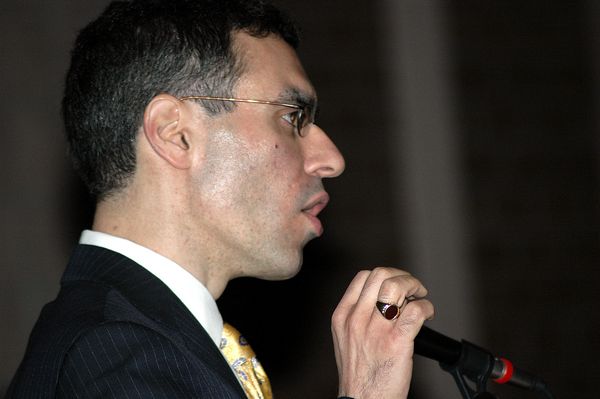Subscriptions
Menu
Advertisements
On the internet, we're not all friends
4/15/2009 |
By Patsy Nicosia |

On the internet, no one knows you’re a dog.
Even worse:
What happens online stays online.
Those are just two of the things John Maggiore, a policy advisor for the state attorney general’s office, made clear in his presentation on internet safety at Sharon Springs Central School Thursday.
The dog line—“It’s a joke, but this isn’t a joke,”—Mr. Maggiore told the audience of middle- and high schoolers, fell a little flat.
If you didn’t get it either, it’s a way of pointing out that online, no one necessarily has to be who they say they are; a 56-year-old man can say he’s a 14-year-old girl and no one’s the wiser, Mr. Maggiore said.
As for things staying online, Mr. Maggiore said once something’s posted on a social networking website like Facebook, you have no control over where it ends up—or who sees it.
Much of what Mr. Maggiore had to say, the kids have probably heard before, but he urged them to take just one new thing home with them.
“Social networking, gaming, chat rooms—they’re all part of everyone’s lives,” he said as he interspersed his own remarks with videos.
“But you need to understand the behaviors that put you at risk.”
On a social networking site like Facebook, which lets you accept “Friends” who can then view your site, Mr. Maggiore said, “You probably don’t want any 40-year-old friends—like me.
‘Friends’ should be someone you know, he said, and it’s hard to imagine any high schooler having 512 ‘Friends’, like one of the teens in the video he showed.
Mr. Maggiore said the kids probably never want to meet someone they know only online in person.
But if there’s a reason to, he said, take your parents with you and meet in a public spot.
Anything that sets off alarm bells, he said, and especially threats, should be reported immediately to an adult you trust—though online predators are adept at getting around that by isolating or “grooming” their victims.
“They tell you, ‘Don’t tell. This is our secret,’ “ he said, adding, “I’d be willing to bet that some of you have this going on now—grooming, communicating with people you’ve never met. Adults…”
Mr. Maggiore said it’s not just girls who need to be concerned; boys are victims too and often find it harder to talk about.
From safety on the social networking sites where kids can be the victims, Mr. Maggiore switched to cyberbullying and online gaming, where they can become the victimizers.
“Typically, this kind of harassment is between young people—and it can be wrenching,” he said.
Save the evidence, tell an adults, call the cops or report the problem to your internet provider if things get out of control, he advised.
“And you don’t have to respond to every IM, every email…”
Finally, Mr. Maggiore warned the students against handing out information like parents’ credit, social security, and bank account numbers, birthdates or addresses.
‘If it sounds too good to be true, it is,” he said, “especially if it’s a prince from a foreign land looking to disperse his wealth,” a common internet scam.
Mr. Maggiore said after his presentation that it doesn’t really work when parents try to keep their kids away from things like Facebook or texting.
“They’re kids. They’ll rebel.”
Instead, he said, monitor their use of the technologies, set limits, and keep the online lines of communication open.
SSCS is also making copies of the brochure, “Your Child’s DIGITAL Life: Safety Tips for Parents,” available at its front desk for any interested parents.









